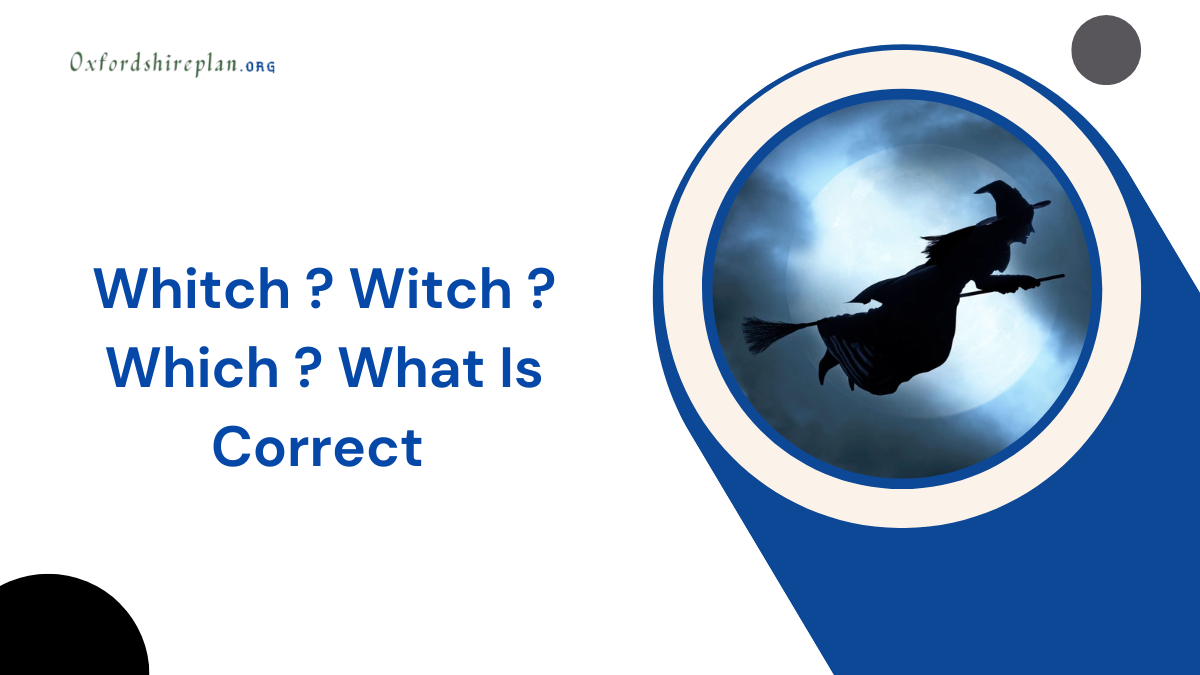Have you heard the word “Whitch”? This is not a correct word. It’s a misspelling that is made by combining “witch” or “which.” whitch does not have any meaning and should not be used anywhere.
whitch is made up of two words. Let’s break down those words and understand their meanings, which is asking for a favourable or preferred option from many other options available. It’s basically asking for your choice. For example,
- which dress will you choose from the wardrobe?
- Which question do you not understand?

Contents
Whitch, Explained
Witch means a woman who practices black magic or witchcraft. She has some extra powers or knows how to do magic on people. You might have seen it in some cartoons or movies. E.g.
- People living in a village are afraid of witches.
- Komal is dressed up like a witch for Halloween.
Whitch is a typing error and is not an accurate word in English. People might be writing which or witch, but they end up writing “whitch” because of their similar sounds.
Additionally, there are other variations of the word whitch, such as Whitcher, whitched, and Bewitched, which are also wrong and should be avoided. These are incorrect words and can create confusion among people; also, the actual meaning of the message will not be communicated. You will always make a good decision while writing if you understand the proper usage of the words.
For example, “which” is used when asking about a person’s choice, such as “Which is the best dress?” Meanwhile, “witch “ means a lady with extra powers who knows the art of black magic. For example, you might say, “Kids are afraid of witch stories.”
Understanding and learning the correct form of words and their meanings can effectively translate your message while avoiding misspellings. One should develop a habit of double-checking spellings and communicating messages, especially with homophones, i.e., words that sound alike but have different meanings.
This way, you ensure your writing is Straightforward and formal. If you want to know why errors happen between two or three words and how we can solve them, keep reading to learn more!
Homophones; linguistic concept.
Homophones are words with similar sounds but different meanings and spellings. Because they are identical in sounds, people get confused while speaking or writing.
- For example, there are a lot of flowers in the garden.
- Parents can take Their children.
- They’re planning to go to sea.
- I need Flour to make pieces of bread.
- I love this Flower.
The better tip is to learn and understand these meanings and use them often in sentences.
Below are the common phrases with examples that most people need clarification on. Keep reading to know which is correct.
Is the correct expression ‘a witch hunt’ or ‘a which hunt’?
Ans The correct expression is “a witch hunt”.
“Witch hunt” means unfairly targeting someone without solid proof to claim that person is guilty. Remember that ‘witch’ is the correct word used here. This phrase is frequently mistaken for ‘a witch hunt’ because they sound the same.
Is the phrase ‘the extent to which’ or ‘the extent to witch’
The right one is ‘the extent to which’, which means how something goes far or how genuine the thing is.
For example, The extent to which she studied increased her grades.
What’s the correct phrase ‘, which had been’ or ‘, ‘witch’ had been’?
Which had been the correct phrase. for eg
The cafe, which had been closed for a while, is now open.
Should it be ‘, which is the’ or ‘,’ witch ‘is the’?
‘Which is the ‘correct phrase. For example, the dress ‘which is’ on the table is mine.
Conclusion
Homophones are words that sound similar but have different spellings and meanings. The above article is about homophones. Often people get confused between words like ‘ witch ‘and ‘ which’ and make a combined word of both that is “ whitch”. Proper meanings of which and witch with examples are explained in the article above.
Additionally, we have included more about homophones and how to learn them to improve our writing.
Click here to learn more.

Ross, an exam specialist with a passion for education, writes comprehensive articles on exam results and admit cards. His expertise ensures students receive reliable information and useful tips to excel in their exams.


























